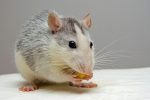
What a little rodent taught me about real estate investing
I was recently working on a talk I’m scheduled to give when quite out of the blue, I remembered a day when I was an undergrad psych major at Yale (a day in 1964, if you can believe) when my professor did an experiment in class that stayed with me for all these years.
He had a little mouse and what looked like a Skinner Box – you might remember those from your college years, an enclosure designed to use positive reinforcement – receiving food pellets in a tray – to teach the mouse to perform some action, like pressing a lever.
The prof came into our lecture hall in front of a hundred or more bright-eyed freshman carrying a modified version of the box: It had two separate levers that would each deliver food pellets, and one of the levers was designed to pay off much more frequently than the other.
What was special about this setup was that when the mouse pressed one of the levers, sometimes he would get a pellet and sometimes he would not. But one lever delivered food two or three times more often than the other.
And there was another aspect of this experiment that was also not typical: The mouse wasn’t the only subject. Each of us students was also supposed to play mouse — i.e., to choose which lever we wanted to “press” for each trial and to keep track of our choices and the outcomes on paper, in that pre-digital age. At the end, we would compare notes to see who got the most food, the mouse or the Yalies.
Clearly the mouse had earned a better grade in his Probability and Statistics class than any of us, because he beat us hands down. Why?
The professor had apparently done this demonstration before because he was not surprised by the result. The students quickly noticed the food delivery pattern, and our strategy was to try to match that pattern.
The mouse also observed that there was a greater probability of getting food from just one of the levers so he quickly adapted his pattern to press only the lever that gave the most frequent reward.
The professor explained that, for us students, this was a game and we wanted to try to outsmart the box. For the mouse, however, food was a necessity, so for him this was about survival. He needed the food and he realized his chances were better if he stuck with the choice that offered the highest probability of success. In an age before financial calculators or Excel, he did the math intuitively. And unlike most of us back then, he didn’t even have a slide rule.
I’m sure you’re asking, what does this have to do with us as income-property investors? The lesson of the mouse, I believe, is that if we’re taking our investment decisions seriously, then we should be basing those decisions on real data (pun intended), not on personal likes or dislikes, emotions, or a gut-reaction to the property.
He was laser-focused on the data he observed – how the two levers were producing food — and opted for the strategy that would give him the greater overall food flow. We would call it the greater cash flow. As investors, we need to understand how to analyze our data, figure the rate-of-return metrics, and identify our most profitable choices.
That’s why for lo, these many decades, I’ve been teaching investment analysis and providing software to expedite the calculations.
That mouse didn’t show up at graduation four years later, but nonetheless I think his time at Yale was well spent. He taught me something that stuck with me.
If you want to make informed, data-driven real estate investment decisions, use our Real Estate Investment Analysis software. The Express or Pro Editions will do all the math and reporting for you.
The information presented in this article represents the opinions of the author and does not necessarily reflect the opinions of RealData® Inc. The material contained in articles that appear on realdata.com is not intended to provide legal, tax or other professional advice or to substitute for proper professional advice and/or due diligence. We urge you to consult an attorney, CPA or other appropriate professional before taking any action in regard to matters discussed in any article or posting. The posting of any article and of any link back to the author and/or the author’s company does not constitute an endorsement or recommendation of the author’s products or services.
Mastering Real Estate Investing
Learn how real estate developers and rehabbers evaluate potential projects. Real estate expert Frank Gallinelli — Ivy-League professor, best-selling author, and founder of RealData Software — teaches in-depth video courses, where you’ll develop the skills and confidence to evaluate investment property opportunities for maximum profit.